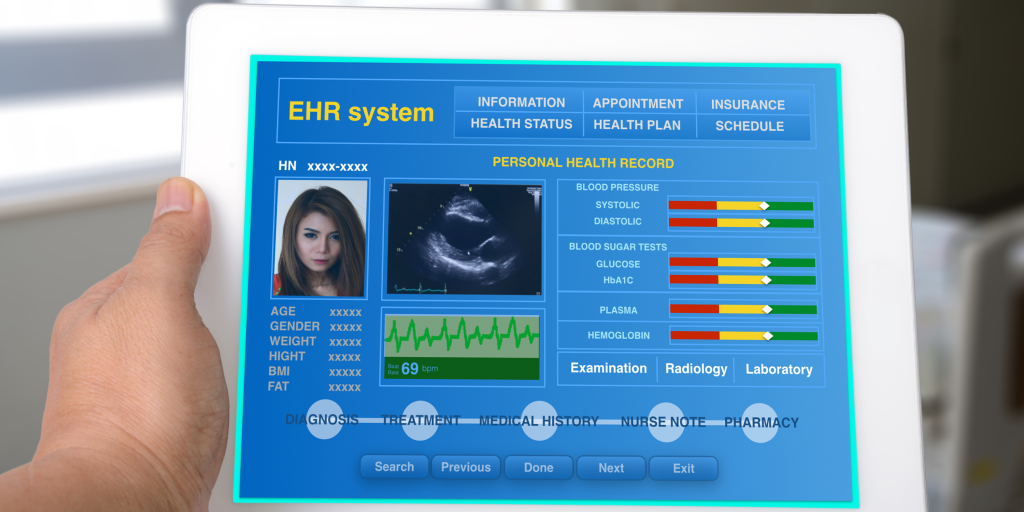
Why some patients like being able to schedule appointments online
Welcome to our informative blog post on healthcare online appointment scheduling! Patients are increasingly scheduling their medical appointments online in this digital age of ease and efficiency. No more receptionist phone tags or long hold times. Patients can make appointments anytime, anywhere with a few clicks. What makes online scheduling appealing? Let’s explore why patients prefer this modern healthcare model.
Ability to access medical records and information online
No more rummaging through mountains of paper records or depending on memory to manage our medical information. Online appointment scheduling lets patients access their medical records with a few clicks.
Accessing medical records online is convenient. Patients no longer require healthcare providers for all health history information. A protected portal lets them examine test results, medication lists, and past visit summaries.
Easy access to this critical information empowers patients to manage their healthcare. They can analyze lab findings at their own pace, explore doctor-prescribed drugs, and make better treatment decisions.
Online medical record access improves patient-provider communication and convenience. Reviewing their information beforehand allows patients to prepare queries and concerns.
Since both parties know about previous treatments or diagnoses, this access improves appointment conversations. It’s like having an extra set of eyes over your care, giving you knowledge for better results.
Online medical record access has limits. Protecting patient data from unauthorized access requires rigorous privacy consideration. Advanced security protocols reduce these threats while offering patients simple access.
Improved communication between patients and healthcare providers
Every facet of life, including healthcare, requires good communication in today’s fast-paced environment. Patients used to phone the doctor’s office during limited hours, wait on hold and hope to talk to a receptionist. Online appointment scheduling tools have transformed patient-provider contact.
Patients can send messages or inquiries immediately through online scheduling, a huge benefit. This reduces phone tag and lets patients talk at their convenience. This simplified communication method makes patients feel heard and understood when asking about medication dosage or test findings.
Online appointment scheduling solutions can offer secure communications for doctors to respond swiftly. This saves time for both parties and eases patients’ health concerns.
Automatic appointments and prescription refill reminders are also common in these systems. This proactive approach reduces missed appointments and ensures medication compliance.
Online scheduling helps doctors exchange critical information with patients. Test results can be viewed through secure portals without an additional visit for disclosure. Patients can check their medical records anytime to make health decisions.
Concerns and limitations of online appointment scheduling
Online appointment booking offers many benefits, but patients should be aware of its drawbacks. Data security and privacy breaches are regular concerns. Online transmission of sensitive medical information requires suitable protections to protect patient confidentiality.
The lack of provider-patient interaction is another drawback of online scheduling. Patients may want to discuss their symptoms or concerns with a receptionist or nurse before making an appointment. Without communication, appointments may be planned incorrectly or without enough information.
Also, not all healthcare providers offer online appointment scheduling. This may force patients who rely on this convenience to seek care elsewhere. Website breakdowns and malfunctions can also impair online scheduling systems.
Online scheduling is convenient for many patients, but not all. Elderly users who are less tech-savvy may prefer phone calls to these sites.
Patients should measure these drawbacks against the benefits when considering online appointment scheduling. Patients can make educated decisions regarding their healthcare professional interactions by evaluating their needs and preferences.

The Convenience of Online Scheduling
Today’s fast-paced world requires convenience. Online booking for medical appointments is convenient for many patients. Patients can search and reserve appointment times with a few clicks without calling or waiting.
Online scheduling’s 24/7 availability is a major benefit. Patients no longer need to call during office hours or wait overnight for appointments. They may schedule appointments anytime they choose, whether it’s early in the morning before work or late at night after the kids go to bed.
Another benefit is viewing all healthcare providers and choosing one based on specialization or patient evaluations. Patients can make informed care decisions and choose a physician that meets their needs.
Online scheduling eliminates long hold periods and receptionist phone tags. Patients can log in, check availability, and schedule without conversation.
Online booking is helpful for disabled or chronically ill people. They can schedule appointments from home without dealing with transportation or physical discomfort.
How Online Scheduling Saves Time and Effort
Patient and provider time savings are one of the main benefits of online healthcare scheduling. Traditional appointment booking procedures require patients to wait a long time on hold or for a callback from their doctor. Frustrating and time-consuming.
Online scheduling lets patients arrange appointments at any time without waiting on hold or playing phone tag with the receptionist. They choose an appointment on the healthcare provider’s website or app that meets their schedule.
This convenience saves patients time and decreases their healthcare management effort. They can arrange an appointment online in minutes instead of spending hours attempting to call the office or making several calls to find a slot.
Online scheduling also avoids manual appointment booking errors. Patients no longer have to worry about the phone or handwritten miscommunication. By directly entering their information into an online system, users ensure correct recording and minimize confusion at the clinic.
Online scheduling also simplifies healthcare provider administration. Clinics can save paperwork and human error by automating appointment bookings with digital solutions coupled with EHRs.
Avoiding Phone Tag and Wait Times
Doctor’s appointment scheduling is frustrating because of phone tag and excessive wait times. Leaving voicemails, waiting for responses, and being put on hold might feel endless. Luckily, online appointment scheduling solves this.
Online scheduling lets patients browse time slots and choose the best one. Calling many times or waiting on hold is unnecessary. Logging in lets patients arrange appointments at their convenience.
Online scheduling saves patients and providers time by reducing phone tag and wait times. Patients no longer have to waste time calling busy clinics or waiting for callbacks. Instead, customers can book an appointment with a few clicks.
Online scheduling lets patients view real-time availability without outdated printed schedules or limited office hours. This prevents double bookings and scheduling issues and saves time.
Online appointment scheduling streamlines administrative processes and reduces phone tag and wait times for healthcare professionals. Staff can spend less time answering phones and more time on other activities by automating the booking process.
Online appointment scheduling reduces phone calls and wait times, improving patient happiness and healthcare efficiency. This useful application lets patients arrange appointments simply and physicians optimize their workflow.
Accessibility for Patients with Disabilities or Chronic Conditions
Patients with impairments or chronic diseases benefit greatly from online scheduling, making healthcare management easier and more accessible.
Online appointment scheduling minimizes the need for physical travel and lowers dependence on others for transportation for people with mobility challenges or difficulty leaving their homes. This allows patients to make appointments from home without traffic or inaccessible facilities.
Online scheduling improves hearing-impaired individuals’ communication with doctors. These people can use a website to schedule appointments at any time instead of trying to hear over the phone or depending on others.
Patients with chronic diseases need periodic checkups and follow-ups. Online scheduling simplifies this procedure by letting them browse available time slots and choose an appointment that fits their schedule. This avoids several calls and long callback waits.
Some cognitively impaired patients may have communication issues. Online scheduling lets them access past appointments and medical records whenever. This allows them to deliver precise condition information at each visit, ensuring continuity of care.
Online scheduling lets patients manage their health tasks efficiently, empowering them beyond convenience. Healthcare facilities are making medical care more accessible for everyone, including those with disabilities or chronic diseases, by adopting technology and user-friendly platforms.
Integration with Electronic Health Records
Online appointment booking integrates well with EHRs, a major benefit. This interface gives doctors access to patient data before and during appointments, improving efficiency and personalization.
Online scheduling platforms linked to EHR systems allow doctors to view patients’ medical histories, including diagnoses, prescriptions, and allergies. This information helps them choose treatments and provide proper care.
Online scheduling with EHRs eliminates manual data entry. Online appointment scheduling automatically records patient information. This decreases the risk of errors or miscommunications while using paper records or transferring data.
Online access to electronic health records improves healthcare provider coordination. Specialists can consult or advise patients remotely after reviewing their medical history.
Online appointment scheduling using electronic health records simplifies healthcare by providing simple access to vital medical data and reducing administrative work for patients and clinicians.

The Future of Online Scheduling in Healthcare
Online scheduling in healthcare has significant potential to improve patient experiences. As technology advances, online scheduling platforms and EHRs will integrate more smoothly. This allows people to arrange appointments, see their medical records, and contact doctors in one spot.
AI in online scheduling tools is an exciting future prospect. AI algorithms can use a patient’s medical history and symptoms to recommend appointment times or give virtual consultations. This could simplify healthcare recommendations and reduce doctor visits.
Mobile apps for online scheduling are becoming more convenient and accessible. As cell phones become prevalent, patients will have more mobile healthcare options. Mobile apps can remind patients of appointments and prescription refills, helping them manage their health.
Video consultations will also be readily integrated into online scheduling tools as telemedicine grows. This would allow patients to see doctors remotely without visiting a clinic or hospital.
Online healthcare scheduling has a bright future as technology becomes increasingly incorporated into our daily lives. Digital platforms make making appointments and using medical services easier and more tailored for patients.
Conclusion
Online scheduling benefits patients and healthcare providers in today’s fast-paced society. Many patients prefer this strategy since they can access medical data and information online, communicate better with healthcare experts, and schedule appointments from anywhere.
Online scheduling saves time and eliminates phone tag and wait times. It makes appointment booking easier for disabled or chronically ill individuals. Integrating electronic health records means that healthcare practitioners have all essential information during each visit.
Online scheduling tools will get more imaginative as technology advances. These innovations, from real-time availability updates to personalized reminders and notifications, will improve patient experience and streamline healthcare provider administration.
For many patients, online appointment scheduling is worth the risks. This practical alternative lets people manage their healthcare visits without delays or difficulties.

